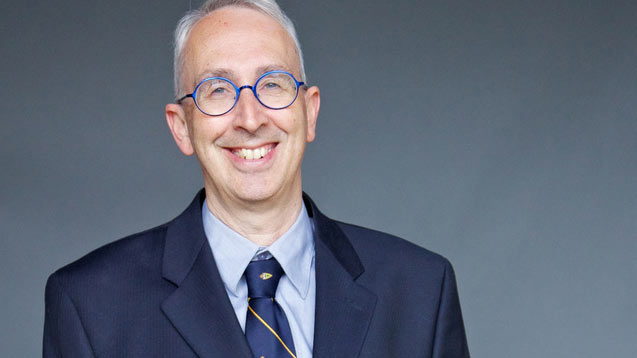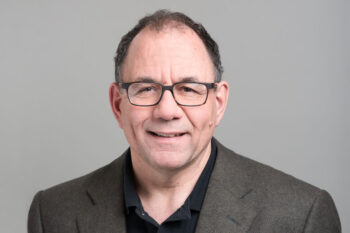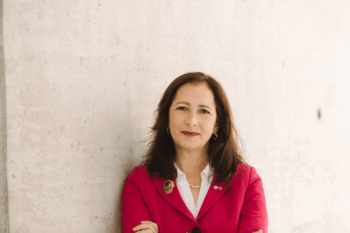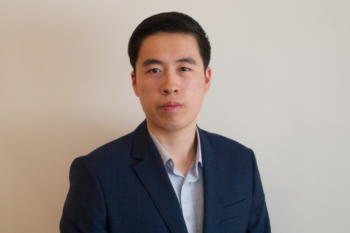Steven Thorpe (MSE) never intended to become a professor.
“The thought never even crossed my mind until I was a TA in a course being taught by George Craig,” says Thorpe. Craig, who passed away in 2004, was a professor in what was then known as the Department of Metallurgy and Materials Science, now U of T Engineering’s Department of Materials Science & Engineering.
“He came to my tutorial session, watched me explain the concepts of creep of materials to students and left without saying a word. Afterwards, he asked me to come by his office. I thought I had made some fatal mistake, but in 15 seconds he changed my entire life with the words: ‘Steve, you are a natural teacher and should be a professor.’”
Today, Thorpe was named among the recipients of the 2023 U of T President’s Teaching Awards, the highest honour for teaching at the University of Toronto. The award recognizes faculty members who demonstrate a substantial commitment to teaching innovation and excellence.
“It is an incredible honour to have received this award from my peers, mentors and students whose lives I have touched,” says Thorpe.
“I wish to share this honour with them and through them and their accomplishments. I am very grateful to everyone who has been part of this journey.”
Thorpe says that motivating, mentoring and supporting students is central to his teaching philosophy. He is an advocate of active learning, a range of techniques that aim to help students engage more deeply with their course material — for example, interactive tutorial problem solving, case studies or in-depth multidimensional design projects.
One example of this approach is a course that Thorpe designed: MSE458/1058 Nanomaterials in Alternate Energy Systems. While many design courses focus on the technical aspects, Thorpe wanted to emphasize the pathway from an initial conceptual idea through to the creation of a successful business venture.
In the course, students — including some from Faculties beyond U of T Engineering — work in teams to complete a detailed, open-ended design project to create a new infrastructure based on sustainability through hydrogen. They then pitch their solution to a team of CEOs, senior design engineers and financial experts, in a module fashioned after the hit television show “Dragons’ Den.”
“The course has led to some students starting their own companies, while others have gained employment in the nanomaterials and hydrogen sectors because of their multidimensional exposure to design in the course,” says Thorpe.
“We also recently had a team take first place against 32 international schools for a hydrogen yacht design and fueling infrastructure, as part of an annual competition organized by the Hydrogen Education Foundation in Washington, D.C.”
Thorpe is also a champion of Technology Enhanced Active Learning (TEAL) rooms, several of which are permanently incorporated into the Myhal Centre for Engineering Innovation & Entrepreneurship. These flexible and dynamic environments are designed to break down artificial barriers between teacher and student.
Thorpe is an active member of a Community of Practice that has grown up around the TEAL facilities. It comprises a group of professors recognized as university leaders in advancing innovative pedagogies, who support their peers in creating vibrant, relevant and effective learning experiences.
“I converted all my lectures and tutorials into a format that embraced the enhanced video presence and capability of the classroom,” he says.
“I often then invert the class to a centralized lecture to clarify a design concept or feature, and then revert again to detailed design in minutes. The combination of creative and critical thinking aids in preparing them for the jobs of the future.”
“Professor Thorpe opened up a new world of discovery for me,” says Thorpe’s former graduate student Ryan Gilliam (MSE 0T4, PhD 0T8). Gilliam is CEO and founder of Fortera, a company that focuses on reducing the carbon footprint of cement manufacturing.
“In my experience, he was the first professor to tie technology to economics and market, the three pillars needed to develop a successful company. This instilled in me the value of looking at all aspects of a technology, something I still apply to my work today.”
“Our mission to prepare 21st century engineering leaders requires us to re-think the teaching and learning techniques of the past,” says Christopher Yip, Dean of U of T Engineering.
“Professor Thorpe’s innovative approach is an inspiring example of how to do that, one that will keep us at the leading edge of educational innovation for years to come. On behalf of the entire Faculty, congratulations on this well-deserved award.”



